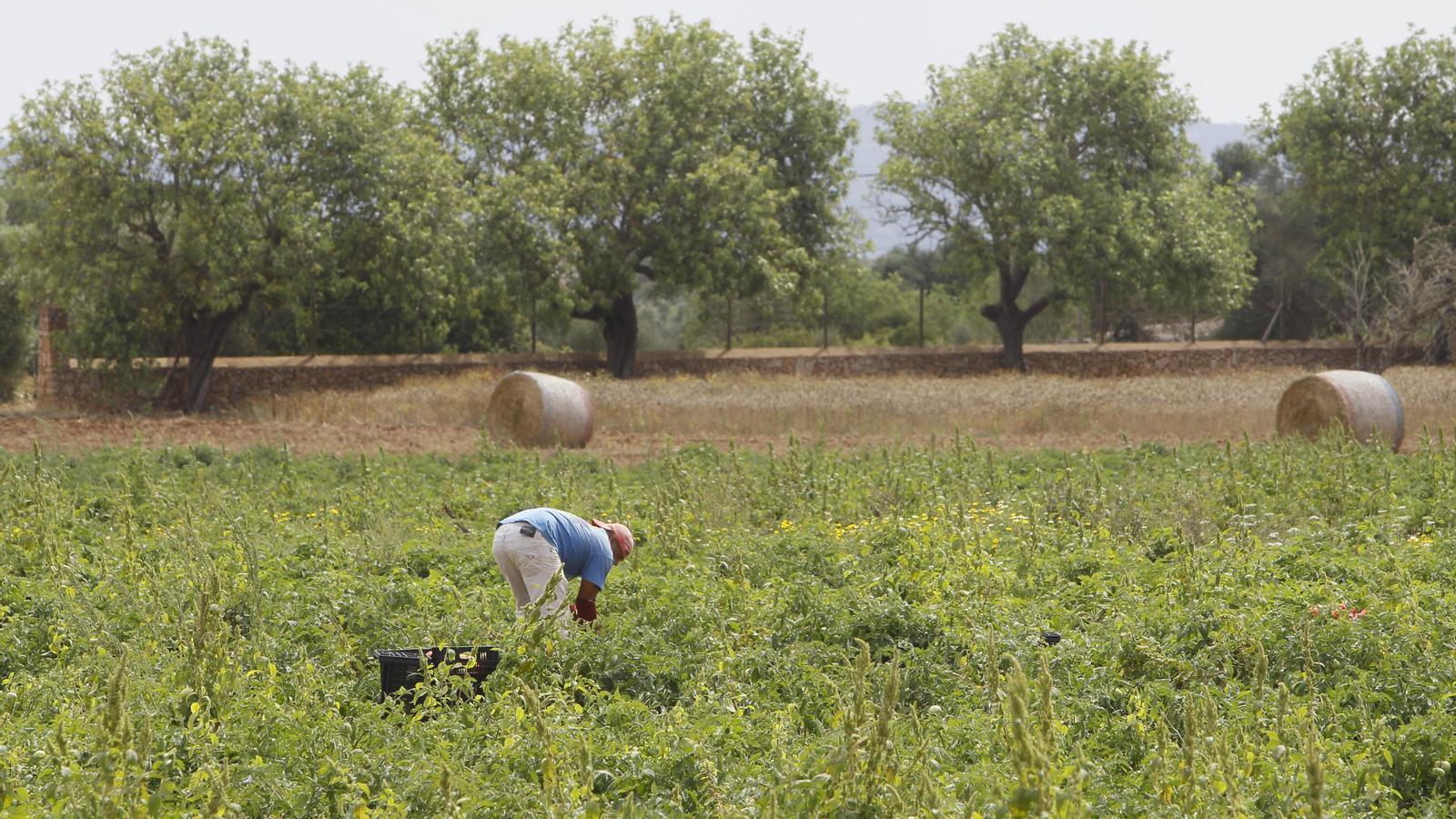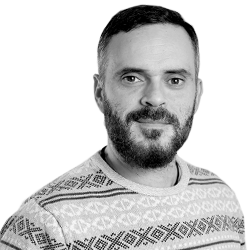"A dog is worth more than me; he has a passport."
Thousands of undocumented immigrants in the Islands are trying to secure a contract as a means of regulation while surviving in precarious conditions.


PalmThe sun rises and Abdou is already bent down, picking fruit from the Mallorcan countryside. He knows when work begins, but never when it ends. His boss, who runs a family business, will let him know. If he's in the greenhouse, Abdou calculates when to escape for fresh air and a quick soak in his shirt to avoid heatstroke. At the end of the day, with the sun already setting, he will receive 50 euros. A tax-free black market ticket for the boss; but a safe passage so that Abdou, like thousands of irregular immigrants, can survive on the margins of society. He is not registered with the authorities. He has no residence or work permit, but he has been living and earning a living since arriving two years ago from Senegal. He is 25 years old. He left behind his wife and son. "Being separated from them is like being dead," he says before recounting the ten-day journey by boat.
He arrived in the Canary Islands and from there, in Palma, where he was taken in by a cousin, Modou, who knows what it's like to start out. He took him to work in the fields to avoid street vending. "He talks to you about getting the papers and smiles with excitement. But it's not easy now and it won't be easy when I have them," warns Modou. And Abdou replies: "I want to be able to walk calmly down the street, be stopped by the police and think: 'Don't worry, nothing will happen to you.' Right now, even a dog is worth more than me, because he has a passport. If one bites me and we go to court, he wins because he has papers and I don't."
Abdou cut his hand with a box cutter in the fields, treated the wound, and continued working. It doesn't matter that Modou explains that he can go to the doctor if he needs to. That he won't be deported. "I know they won't send him back to Senegal, but explain this to someone who's spent ten days at sea. They won't believe you," Modou argues. "I have to endure, but it's not easy. They give away almost rotten fruit at Mercapalma. Half the woman gives it to the pigs and the other half to us. And I'm not a pig," Abdou protests with dignity. "I won't miss work. I pray that, if I make a bonda, they'll give me a contract," he adds. The contract is the gateway to regularization under a complex immigration law, which has reduced the minimum residence period required to prove roots in Spain from three to two years. But breaking the margins isn't so simple, especially when hiring depends on factors like racism and prejudice.
Studies in physics and chemistry
Mamadou (not his real name) had to abandon his university studies in Physics and Chemistry in Senegal to support his family. Upon arriving in Palma, he followed the natural path of street vending, but fears that an arrest would hinder his chances of regularizing his situation. Just as he did in his home country, he has decided to pursue training. He cannot have his qualifications recognized, but he has already taken courses in gardening, computer science, Spanish classes—although he had already studied it in Senegal and speaks it fluently—Catalan, and now, secondary school. He is on a scholarship for the project. I'll accompany you, taught by the Patronat Obrer Foundation with funding from the government and the European Social Fund. He receives 29 euros per day for class. This pays for the 250 euro rent and food. "When I arrived, I felt incapable of doing anything. The trip and coming here without knowing anyone was extremely hard. I don't regret it. Life is hard, but it's better than being there. There are months when I can't send anything home to my family, and I'm sad about that, but I studied hard to have many opportunities," he confesses. Then, an electrical module awaits him. In the meantime, he sends his resume to various job openings. The last one, as a gas station cashier. Without papers, there's no contract. And without a contract, there's no papers. It's a dead end that Mamadou challenges with a reflection: "We are participating in this society, in the economy, whether we have papers or not. Let's do good things. I'm not legalized, but I pay for a Spaniard's house, I shop at the supermarket. It's unacceptable that they treat us like this."
There are no figures on the number of migrants in an irregular situation. Those who arrive by boat are counted. More than 2,700 in the first six months in the Balearic Islands. Then, again, administrative silence. Many of them try to reach other European countries, where they have the support of family members or speak their language. According to sociologist David Abril, irregular immigration "is the result of structurally racist regulations." "We have a social hierarchy and stratification based on whether or not you have papers. It affects families, and there are beneficiaries. There is a very high volume of the underground economy. We focus on people without regular status, but not on the informal economy. The laws are racist and hypocritical. They don't respond to the people. Above all, 20 million tourists are enough. Who will take care of them? Who will build the housing?" Most of these migrants work for people who can afford to pay them less. But they can't claim a day off, or access a mortgage, or ask a real estate agent for a rental. Immigration isn't a UFO. It structures the society of the Islands. It's who we are. There's no going back," he concludes.
'God will provide'
Beatriz arrived from Colombia to Mallorca in August 2019 with her son and, before continuing her story, admits: "I emigrated irresponsibly, improvising and with the maxim 'God will provide.' You have to arrive with the awareness that paperwork matters." Her studies in environmental technology were useless. "Here I had no qualifications, no basic education," she adds, referring to the difficulty of getting them validated. In Sóller, she began working as a live-in carer for a godfather. Hers is a happy, glass-half-full story. The family welcomed her and treated her well. She is full of praise for her. The pandemic arrived, and she was left isolated with the man she cared for. "They paid me well and provided for everything. In addition, they immersed me in their culture, gastronomy, and history. Without losing your love for your culture, you must learn to love the one that welcomes you. It's not betraying your homeland, but being versatile," she reflects. The old man died and she had to leave the rental apartment, but the landlord agreed to let her stay there as a tenant.
She considered returning to Colombia, but her husband, who was caring for their daughter in Cali, dissuaded her. "In my city, there were riots and unrest. In the neighborhood, every day there were news reports of girls being forced into cars, never to be heard from again. Our daughter quit her job and stayed locked up because women are killed there. Colombia is beautiful, the people are warm, but the violence, no violence. You don't even have to take your cell phone out on the street. Anyone can pay a hitman to kill you from his motorcycle over a simple neighborhood dispute," she says.
Six years later, she lives with her entire family in Sóller. Her husband, an electronics engineer, studies electricity and Catalan, like her. They all work in cleaning, caring for the elderly, or moving. Whatever comes up. All of them are in an irregular situation. When the opportunity for a pre-contract arises, their employees are held back by bureaucracy. Meanwhile, they build their income hour by hour thanks to referrals. Ten euros. Eight if there's no other option, and 12 "when they pay well." "The government's new reform is friendlier to both employers and employees. I trust that someone will hire us," she says, without losing hope. She calls for a less paternalistic view of emigration. "When I go to get information to move forward, they talk to me about food. I accept and appreciate their help, but I don't want it to be given to me; I want to be able to decide what to eat. These are very small details. I don't want more help, just a decent life where I can fend for myself, because this is now my homeland," she concludes.
